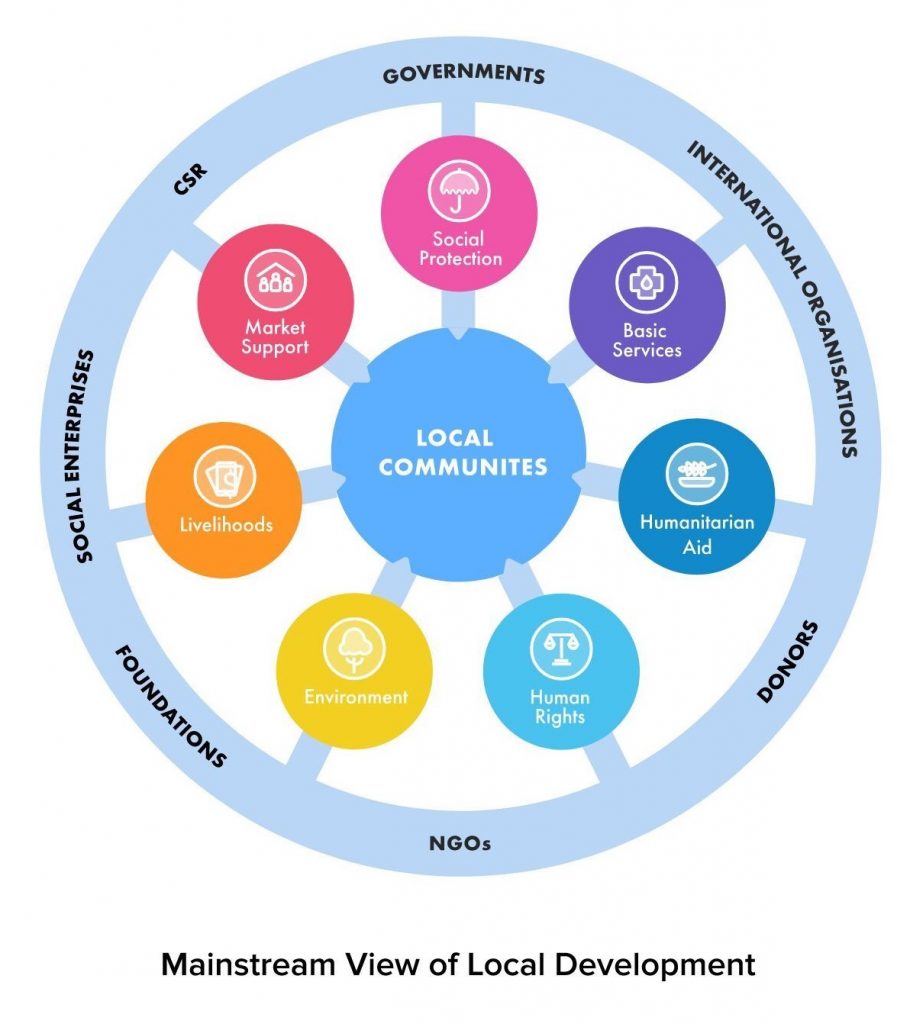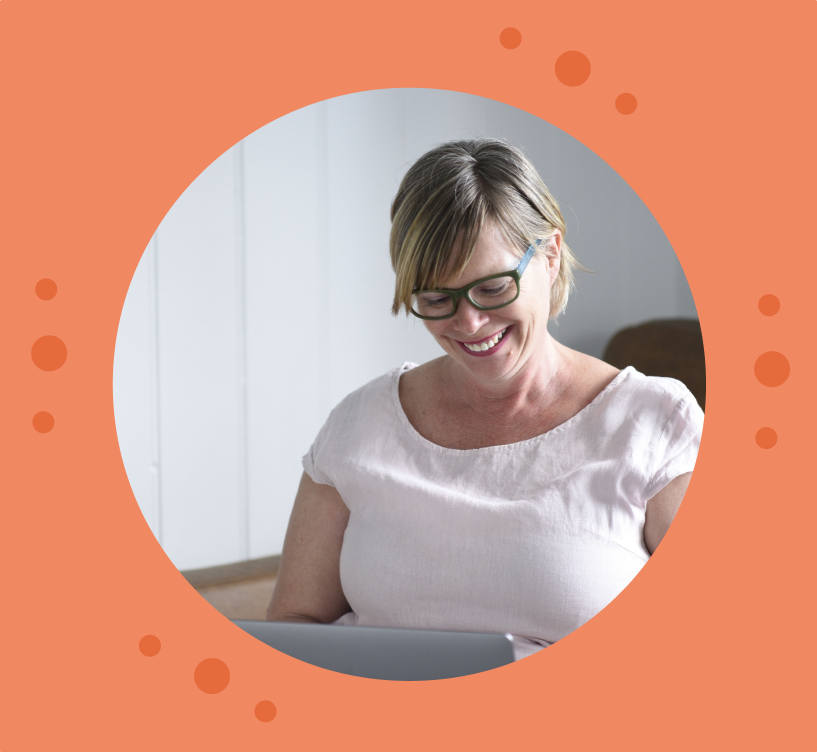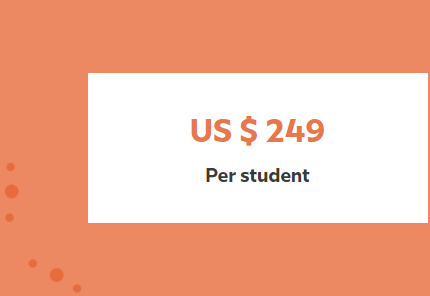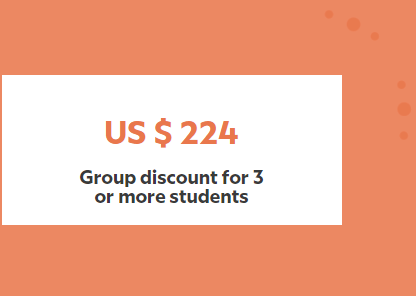Learn the Principles and Strategies of Good Local
Development
Next Course Starts
(20 hours Total)
Time Commitment
Price

Encourage greater community engagement in your project or program?

Achieve more sustainable outcomes, that continue even after the project funding ends, because community members and local leaders are committed to the project?

Learn simple strategies and tools that you can apply in your own work, to help make this happen?
A common presumption is that if a project has good technical design, then good local development outcomes will follow. But the reality is: designing a program that is technically sound is only half of the equation. The other half is designing your program to fit the local context.
The Principles of Good Local Development online e-course breaks down the core principles, strategies, tools—and mindset—to help you do this.
It begins with challenging how we ‘see’ local development:


By the end of this course, you will be able to:

Analyse the top-down and bottom-up elements to your, and other organisations', work - and trace the factors leading to this situation.

Recognise charity-based versus justice-based approaches in your sector, and develop strategies to working in greater solidarity with community members.

Understand the real contributing factors to the problem of community dependency, how this intersects with the saviour complex, and how to address these issues in your own work.

Measure the extent to which you and your organisation share power with community members, and develop a strategy to open up your project to greater community involvement.

Understand the importance of customary/traditional law & religious and cultural norms, and engage effectively with these systems as part of your basic operating environment.

Reach beyond the local leadership, to engage more deeply with other sectors of the community in a manner that is legitimate and effective.

This course is designed to be as accessible as possible. While everything I teach is based on a strong theoretical framework, the lessons are simple, and focused on practical application. The site is designed to make it as easy as possible to navigate, access materials, and keep track of where you are up to—so you can focus on learning.
Although the live course goes for 4 weeks, you will have access for 6 months. This allows you to try out what you learn, return and dip back into different sections of the course as you reflect on how the principles, tools and strategies apply in your work and community context.
You get all of the benefits of working with the Founder & Director of Bridging Peoples, Dr. Deborah Cummins – giving her BEST teachings, tools, strategies and advice – without having to pay hefty consultant fees or enrol in a University course!
Perhaps most importantly, you get access to a community of like-minded professionals. People who, like you, want to really make a difference in people’s lives through their work. And who are prepared to step up, challenge themselves to think differently about their work, and try something new.







This course is for anyone wanting to learn the fundamental principles of doing good local development. It’s designed for all levels; except for ability to work in English and a working internet connection, there are no pre-requisites to taking this course.
If you’re new to development work, the course will take you step-by-step through the concepts and tools to give you a solid grounding in the field. If you’re more experienced, the course will allow you to expand (and sometimes reframe) your experiences, gain new tools and frameworks to improve your work processes, identify the most important factors shaping your work at the local level, and ultimately share decision-making power more effectively with communities.


Access to our 4-week courses on the principles of good local development work, including practical strategies and tools you can use again and again.
Regular Q&A sessions via our online Network, to keep you on track.
Bonus 4 Hours Additional Training:
* Case Study on Using the Power Sharing Spectrum.
* Masterclass & Case Study on Community Organising.
* Masterclass on Hybrid & Customary systems of governance.
* Case Study on using the Bridging Peoples Framework.
Bonus trainings are recorded sessions with network members from Africa, SE Asia and Middle East, to demonstrate how they put the ideas and tools shared in this course into practice in their work.
New round is now open!
10% discount for groups of 3 or more people!
We want you to be really happy with your investment in Principles of Good Local Development. We’re confident that with all of the knowledge, goodness, and practical wisdom that is packed into this course, you will be happy.
But if you’re not: all you need to do is email us at academy@bridgingpeoples.com within seven days of your course commencing, and we’ll refund your money, minus 5% of the full price to cover admin costs. You will need to complete and provide your first two reflection sheets as proof that you have been engaging with the materials.
We’re sure you won’t need to use this guarantee. But we’re offering it because we want you to feel really confident in investing in this course

Principles of Good Local Development is an entry-level course, to teach you the principles and practices of doing good local development. It gives students a broad overview of international development, community development, and related fields of community engagement, organising and mobilisation, so they understand the connections between these fields. It also has a strong practical component, providing students with some useful tools and strategies that they can use in their own work. Students learn about top-down and bottom-up development, the differences between charity and justice-based approaches, how to analyse power relations in our working lives, dealing with community dependency, the importance of customary governance, and more.
This course is for anyone who is interested in learning about the basic principles and practices of good local development, including aid & development workers, volunteers, international and community development students, as well as people working at the local level in their country of origin (cross-culturally or otherwise).
As this is an online course, you will need access to a computer, as well as a decent internet connection. We try to cater to those with slower internet connections by optimising our training videos to make them as quick as possible. We also provide all materials in a variety of formats: so even if your internet doesn’t allow video streaming you can still access exactly the same information via our downloadable audio files, and/or written transcripts. If you are concerned, you should check if you are able to easily view this video HERE If it does not load properly, it’s likely that you will not be able to view our training videos in the membership area.
The course is a series of eight online training videos, accompanied by downloadable audio files, quizzes, worksheets, and reflection activities. There is also a weekly Q&A session in our members-only discussion forum.
The investment in this course is US$249.00. There is a special discount of 10% for groups of 3 or more.
Yes! We love it when groups join up, as you can discuss what you learn and support each other, as you go through the materials. To encourage this, we offer a 10% special discount for groups of 3 or more.
Registrations for the next round closes 1st March 2024.
The next round begins 4th March 2024.
No. Doing good local development requires an investment of time, effort, understanding, and skills. While we can help with the understanding and skills, the time and effort needs to come from you. As such, while we will support you in your work, we cannot and do not guarantee you will be a better local development work, just by doing this course.That said, we do provide ongoing support to our alumni via our Bridging Peoples Network – so if you ever find you need extra support, and are a member of this Network, then you can trouble-shoot it with us, and with a community of your peers. You won’t be alone through this journey.
No. The success – or failure – of your project comes down to many different factors. Many of these will be unique to your work and community context. While we will share with you the most important principles to working better locally, we cannot and do not guarantee project success, just by doing this course. That said, we do provide ongoing support to our alumni via our Bridging Peoples Network – so if you ever find you need extra support and are a member of this Network, then you can trouble-shoot it with us, and with a community of your peers. You won’t be alone through this journey.
Yes. We want you to be happy with this course. And with all of the goodness that is packed in, we’re sure you will be. But if you’re not, we’ll refund your investment, minus 5% of the full price to cover admin costs. To request a refund, you need (i) demonstrate you have made a reasonable attempt at the course, by completing the first two modules, including completing relevant worksheets, (ii) make your request in writing, attaching your completed worksheets, to academy@bridgingpeoples.com within seven days of the course commencement date.
We’ve taken every effort to accurately represent this program and its ability to help you work better locally.
However, there is no guarantee that you will achieve local development success just by doing this course. The course is not a magic pill. Nothing on this site is a promise that you will achieve success in your work.
Your level of success is dependent on a number of factors including your skills, knowledge, ability, dedication, network, communication abilities and unique work and community context. Because these factors vary according to each individual, we cannot and do not guarantee your professional success.
You are responsible for the results you achieve. Our promise to you is that we will make every effort to provide you with quality information and guidance to achieve your aims, but the results are up to you.
And finally (phew!) when you enrol for this course, you agree to the following Terms and Conditions.